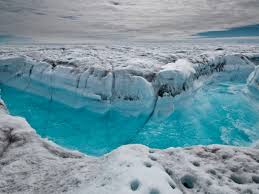For most of human history, the world above 66 degrees latitude has remained largely out of play for large-scale commerce. Explorers, speculators, and scientists long believed rich resources and shipping routes lay hidden beneath the Arctic's ice and snow, but the true nature of its wealth was obscured by the same deadly cold, debilitating darkness, and enormous distances that blocked its exploitation.
在人类历史的大部分时间,纬度66度以上的世界是被大规模的商业活动排除在外的。探险家、投机者、科学家一直相信北极深厚的冰层和雪地里藏着丰富的资源和航线,但这些财富都被死寂一般的寒冷和黑暗隐藏了,遥远的距离进一步阻拦了对它的开发。
Today the Arctic landscape is greener than you are probably comfortable imagining, with fewer caribou and reindeer, more mosquitoes, warmer summers. The most visible and disturbing change has come at sea, where summer sea ice -- the floating expanse that covers much of the Arctic Ocean during the region's brief thaw -- has been disappearing at an astonishing rate.
现在北极比你想象的要更绿一些,只是驯鹿的数量在减少,蚊子增多,夏天温度更高。最明显的影响也最大的变化发生在海上,夏季海上的冰块--曾经即使在短暂的解冻期,它们也会覆盖住几乎整个北冰洋,正在以令人恐慌的速度消失。

While this floating sheet always shrinks in warm months and grows again with the return of the cold, the scale of ice loss has been unprecedented, and some researchers believe it's speeding up. NASA scientists estimate that on average the Arctic loses nearly 21,000 square miles of ice each year, and the experts who prepared the 2014 National Climate Assessment predict the Arctic Ocean will be ice free in summer before 2050.
这个冰盖的面积在稍暖的月份会变小,天气变冷的时候会再变大,消失的冰块的面积变得前所未有的大,而一些研究人员认为这个数据还会上涨。美国航天局的科学家预测每年北冰洋平均减少的冰块面积达近21000平方英里,2014年国际气候评估会议上的专家预测2050年的夏天到来之前北冰洋上的冰块将会全部消失。
"It's all happening much faster than anyone thought," said Michael Sfraga, director of the Polar Institute at the Wilson Center in Washington, D.C. "There's an ocean opening before us in real time."
华盛顿威尔逊中心基地研究所主任迈克尔·斯弗拉加表示:“这一切发生的比任何人想象的还要快。我们面前马上就要出现一片汪洋大海。”













